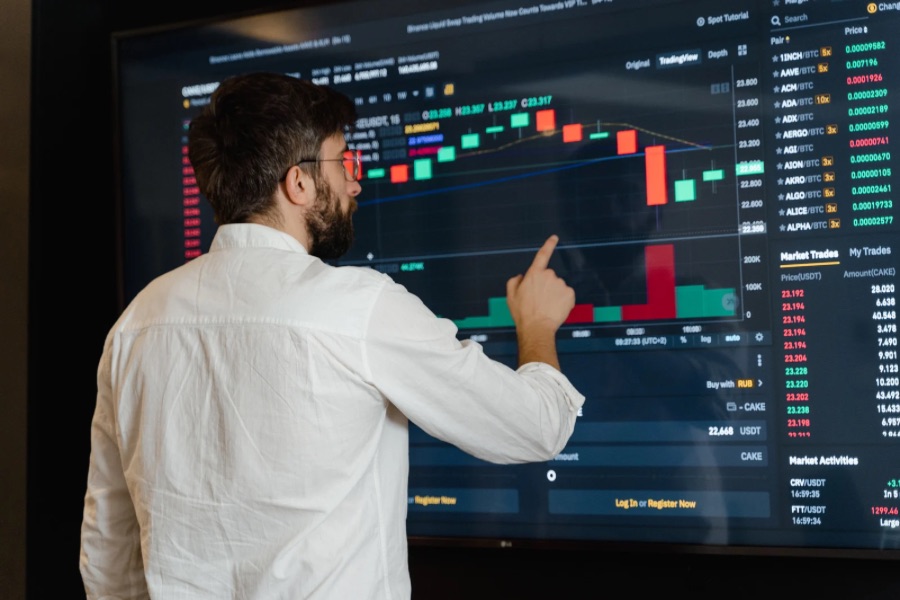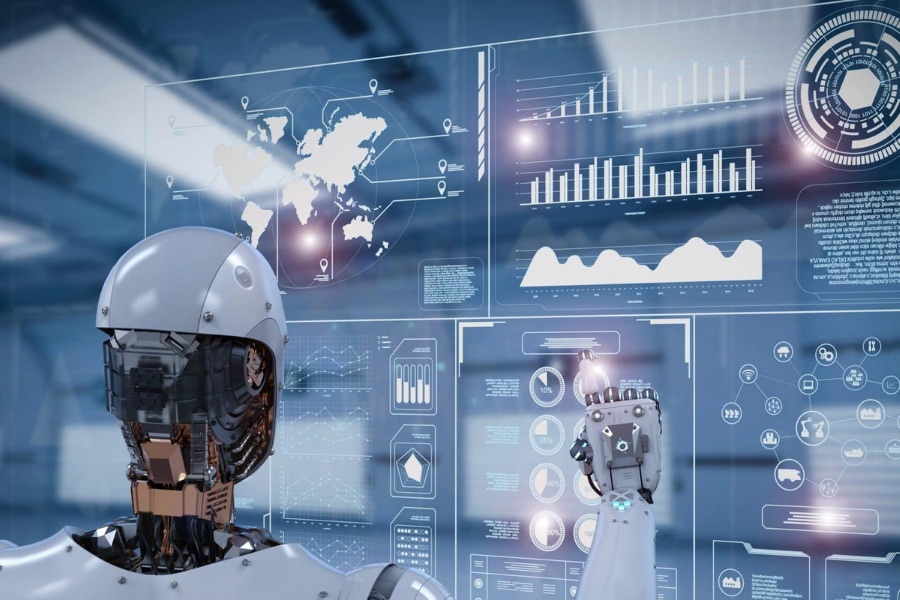AI Meets SEO: Smarter Link Building and Content Strategies for 2025
November 25, 2024, 11 min read
As we approach 2025, integrating artificial intelligence (AI) into search engine optimization (SEO) strategies is becoming increasingly crucial for businesses aiming to maintain a competitive edge in the digital landscape. The synergy between AI for link building and content creation is revolutionizing the way we approach SEO, offering unprecedented opportunities for more innovative, more efficient, and highly targeted strategies. This technological advancement is not just a passing trend but a fundamental shift in understanding and implementing SEO practices. AI’s ability to process and analyze vast amounts of data at speeds unattainable by humans is opening new avenues for optimization that were previously impossible. From predicting user behavior to identifying emerging trends, AI enables businesses to stay ahead of the curve and adapt their strategies in real time. Moreover, the integration of AI in SEO is democratizing access to sophisticated optimization techniques, allowing smaller businesses to compete more effectively with larger enterprises. As we look towards 2025 and beyond, it’s clear that AI will continue to play an increasingly pivotal role in shaping the future of digital marketing and online visibility.
The Transformative Power of AI in SEO
Artificial intelligence is reshaping the SEO landscape, particularly in link-building and content optimization. By leveraging AI-powered SEO strategies, businesses can gain valuable insights, automate time-consuming tasks, and make data-driven decisions that significantly impact their online visibility and rankings. AI’s transformative power in SEO extends beyond simple automation, offering unprecedented capabilities in data analysis, pattern recognition, and predictive modeling. These advancements allow SEO professionals to uncover hidden opportunities, identify emerging trends, and adapt their strategies in real-time to stay ahead of the competition.
AI’s ability to process and analyze vast amounts of data at incredible speeds enables businesses to gain a deeper understanding of user behavior, search intent, and content performance. This level of insight was previously unattainable through manual methods alone. Moreover, AI-driven tools can continuously learn and improve their algorithms, ensuring that SEO strategies remain effective even as search engine algorithms evolve. By harnessing the power of AI, businesses can create more targeted, efficient, and successful SEO campaigns that drive sustainable growth and improve overall online presence.
AI-Powered Predictive Content Strategies
One of the most exciting applications of AI in content optimization is its ability to predict and generate content that resonates with target audiences. AI algorithms can analyze vast amounts of data, including search trends, user behavior, and competitor content, to identify topics and formats that are likely to perform well. This predictive capability allows content creators to focus on producing high-value, link-worthy content that aligns with user intent and search engine preferences.
The power of AI in predictive content strategies extends far beyond simple topic suggestions. Advanced machine learning models can now analyze the semantic context of high-performing content, understanding keywords and the underlying themes and concepts that engage readers. This deeper level of analysis enables AI to suggest content structures, headings, and even specific points to cover that are most likely to capture and retain audience attention.
Furthermore, AI-powered tools can now predict the potential performance of content before it’s even published. By simulating how a piece of content might rank for specific keywords and estimating its likelihood of attracting backlinks, these tools provide content creators with invaluable insights to refine their strategies. This predictive approach significantly reduces the trial and error often associated with content creation, allowing for more efficient resource allocation and higher ROI on content marketing efforts.
As we move towards 2025, integrating natural language processing (NLP) with predictive AI models will revolutionize content creation. These advanced systems will not only suggest topics but also assist in crafting compelling narratives, ensuring that the content is SEO-friendly and genuinely engaging for human readers. This harmonious blend of AI-driven insights and human creativity is paving the way for a new era of content optimization, where every piece of content is strategically designed to maximize its impact on search engines and target audiences.
Data-Driven Insights for Optimized Link Building
Smarter link building with AI involves leveraging machine learning algorithms to analyze backlink profiles, traffic patterns, and competitor strategies. These insights enable SEO professionals to identify high-quality link opportunities and tailor their outreach efforts for maximum impact. AI-powered tools can also personalize outreach messages, increasing the likelihood of successful link acquisition and building meaningful relationships with other website owners.
The power of AI in optimizing link-building strategies lies in its ability to process vast amounts of data quickly and accurately. By analyzing historical data and current trends, AI can predict which types of content are most likely to attract quality backlinks. This allows SEO teams to focus on creating link-worthy content that resonates with their target audience and potential link partners.
Moreover, AI can continuously monitor the web for new link opportunities, tracking mentions of your brand or relevant keywords across various platforms. This real-time monitoring enables SEO professionals to act swiftly on potential link-building opportunities, significantly improving the efficiency of their outreach efforts. AI algorithms can also assess the quality and relevance of potential linking domains, helping to ensure that acquired links contribute positively to the website’s overall SEO performance.
Another crucial aspect of AI-driven link acquisition is its ability to analyze the context and sentiment of web pages. This enables more targeted and relevant link placements, ensuring that backlinks appear in content that aligns with your brand’s values and target audience’s interests. By leveraging these AI-powered insights, SEO professionals can develop more strategic and effective link building campaigns that improve search engine rankings and enhance overall brand visibility and credibility in the digital space.
Combining AI and Traditional Link Building Techniques
While AI offers powerful capabilities, it’s important to recognize that human creativity and expertise still play a crucial role in successful SEO strategies. The most effective approach combines AI-driven link acquisition with traditional manual efforts. For example, AI can efficiently identify potential linking opportunities, while human SEO professionals can craft personalized outreach messages and build genuine relationships with website owners.
This hybrid approach leverages the strengths of both AI and human expertise. AI excels at processing vast amounts of data, identifying patterns, and making data-driven recommendations. It can quickly analyze millions of websites to find relevant linking opportunities, assess the quality of potential backlinks, and even predict the likelihood of successful outreach. On the other hand, human SEO professionals bring nuanced understanding, creativity, and emotional intelligence to the process.
By combining these strengths, SEO teams can create a more robust and effective link-building strategy. AI can handle the time-consuming tasks of research and initial filtering, allowing human experts to focus on high-value activities such as relationship building, content creation, and strategic planning. This synergy enables SEO professionals to scale their link-building efforts while maintaining the quality and relevance of acquired links.
Moreover, this combined approach allows for continuous improvement. As AI systems learn from the success rates of human-led outreach efforts, they can refine their recommendations over time. Similarly, human experts can use AI-generated insights to inform their strategies and decision-making processes, creating a feedback loop that enhances overall performance.
AI Tools for SEO Success in 2025
As we look towards 2025, several AI-powered tools are emerging as game-changers in the SEO landscape. Platforms like ChatGPT, Jasper, and Surfer SEO are revolutionizing content creation and optimization processes. These tools use natural language processing (NLP) to generate high-quality, relevant content that aligns with search engine algorithms and user intent. Additionally, AI-powered link building tools can automate identifying and reaching out to potential link partners, significantly increasing efficiency and success rates.
The integration of AI in content optimization is set to reach new heights by 2025. Advanced AI algorithms can analyze vast amounts of data to predict content performance, optimize for specific audience segments, and even generate articles tailored to individual user preferences. These tools will save time and enhance the overall quality and relevance of content, leading to improved search engine rankings and user engagement.
In AI-driven link acquisition, we can expect to see more sophisticated tools that can analyze the entire web ecosystem to identify the most valuable linking opportunities. These AI-powered systems will be able to assess the authority, relevance, and potential impact of each link prospect, allowing SEO professionals to focus their efforts on the most promising partnerships. Furthermore, AI will be crucial in personalizing outreach campaigns and crafting tailored messages that resonate with each potential link partner, thereby improving success rates and building more meaningful relationships in the digital space.
Emerging Trends in AI-Powered SEO
The rapid advancement of AI technology is driving several emerging trends in the SEO industry. Natural language processing is becoming increasingly sophisticated, enabling the creation of more nuanced and contextually relevant content. AI is also crucial in adapting to search engine algorithm changes, helping businesses stay ahead of the curve and maintain their search rankings. Furthermore, AI-powered voice search optimization is gaining importance as more users adopt smart speakers and voice-activated devices.
As we look towards 2025, the integration of AI in content optimization is expected to become even more prevalent. Machine learning algorithms are becoming adept at understanding user intent and context, allowing for creating hyper-personalized content that resonates with specific audience segments. This level of personalization extends beyond just text, as AI can now optimize images, videos, and other multimedia elements for improved search visibility.
Another significant trend is the use of AI for predictive SEO. By analyzing vast amounts of data, AI systems can forecast upcoming trends and shifts in user behavior, allowing businesses to adjust their SEO strategies proactively. This predictive capability is precious for AI-powered SEO strategies in competitive industries where staying ahead of the curve is crucial. Additionally, AI is revolutionizing local SEO by providing more accurate and up-to-date information for businesses with physical locations, improving their visibility in local search results.
The ethical use of AI in SEO is also becoming a hot topic. As AI systems become more sophisticated, there’s a growing emphasis on transparency and fairness in applying these technologies to search engine rankings. This trend will likely lead to the development of AI-powered SEO tools that optimize content and ensure compliance with ethical guidelines and best practices.iving unprecedented growth and success in digital marketing.
Implementing AI in Your SEO Strategy: Actionable Steps
To harness the power of AI for your SEO efforts, consider the following steps:
- Invest in AI-powered SEO tools that align with your specific needs and goals.
- Use AI for keyword research and topic creativity to ensure your content meets user intent.
- Leverage AI-driven content optimization tools to improve the quality and relevance of your content.
- Implement AI-powered link-building tools to identify high-quality link opportunities and automate outreach.
- Utilize AI for performance tracking and analytics to continuously refine your SEO strategy.
Assessing Your Current SEO Practices
Implementing AI-powered SEO strategies requires a systematic approach. Begin by thoroughly assessing your current SEO practices and identifying areas where AI can make the most significant impact. This might involve analyzing your content creation process, link-building efforts, or keyword research methodologies. Once you’ve identified these areas, research and select AI tools that specifically address your needs.
Using AI for Keyword Research and Content Optimization
When implementing AI for keyword research, look for tools that provide volume and competition data and offer semantic analysis and user intent insights. This will help you create content that truly resonates with your target audience. For AI in content optimization, consider platforms that can analyze your existing content and provide actionable recommendations for improvement, such as adjusting content structure, enhancing readability, or suggesting relevant internal links.
Streamlining Link Building with AI
AI-driven link acquisition tools can significantly streamline your outreach process. Look for solutions that can automatically identify relevant websites, personalize outreach messages, and even predict the likelihood of success for each potential link opportunity. This can dramatically increase the efficiency of your link-building campaigns and help you focus on high-value prospects.
Continuously Monitoring Performance with AI
Finally, to truly leverage the power of AI in your SEO strategy, it’s crucial to monitor and analyze your performance continuously. Implement AI-powered analytics tools that can provide deep insights into your SEO efforts, including detailed breakdowns of traffic sources, user behavior, and conversion paths. This data will allow you to make informed decisions and continuously refine your strategy for optimal results.
Measuring ROI and Performance with AI
One key advantage of incorporating AI into your SEO strategy is the ability to measure and analyze performance with unprecedented accuracy. AI-powered analytics tools can provide deep insights into the effectiveness of your link-building and content optimization efforts, allowing you to make data-driven decisions and continuously improve your strategy.
Tracking Key Performance Indicators (KPIs)
By tracking key performance indicators (KPIs) such as organic traffic, keyword rankings, and conversion rates, you can demonstrate the ROI of your AI-powered SEO initiatives and justify further investment in these technologies.
Advanced Analytics for Comprehensive SEO Insights
The sophistication of AI-powered SEO strategies extends beyond simple metric tracking. These advanced systems can identify complex patterns and correlations that human analysts might miss, offering a more comprehensive view of your SEO performance. For instance, AI can analyze the quality of backlinks acquired through AI-driven link acquisition techniques, assessing the quantity, relevance, and authority of linking domains.
Predicting Future SEO Trends
Moreover, AI’s predictive capabilities shine in forecasting future SEO trends and the potential impacts of strategy changes. By leveraging machine learning algorithms, these tools can simulate various scenarios, helping you anticipate the outcomes of different AI in content optimization approaches.
Real-time Data for Agile Decision-Making
The real-time nature of AI analytics also allows for agile decision-making. Instead of waiting for monthly or quarterly reports, you can access up-to-the-minute data on your SEO performance, enabling quick adjustments to your strategy as needed. This responsiveness is crucial in the fast-paced digital landscape where search engine algorithms and user behaviors constantly evolve.
The Future of AI in SEO: Opportunities and Challenges
As AI continues to evolve, it presents exciting opportunities and potential challenges for SEO professionals.
Opportunities for Enhanced SEO Efficiency
On the one hand, AI has the potential to dramatically increase the efficiency and effectiveness of SEO strategies, allowing businesses to achieve better results with fewer resources. As AI algorithms become more sophisticated, they can analyze and interpret vast amounts of data with unprecedented accuracy, providing SEO professionals with invaluable insights into user behavior, content performance, and emerging trends.
The Challenge of Standing Out in an AI-Driven Landscape
However, the widespread adoption of AI in SEO also presents challenges. As AI-powered tools become more accessible, there is a risk of oversaturation in the market, potentially leading to a homogenization of SEO strategies. To stand out, SEO professionals must develop unique approaches that combine the power of AI with human creativity and intuition.
The Need for Continuous Learning and Adaptation
Additionally, the rapid pace of AI development may create a knowledge gap, requiring continuous learning and upskilling to stay ahead of the curve. Despite these challenges, the opportunities presented by AI in SEO far outweigh the potential drawbacks.
The Future of AI in Content Optimization and Link Building
As AI technology continues to advance, we can expect to see even more innovative applications in areas such as AI for link building and AI in content optimization. These advancements will likely lead to more personalized and user-centric search experiences, benefiting businesses and consumers.
By embracing AI and staying adaptable, SEO professionals can position themselves at the forefront of this exciting technological revolution, driving unprecedented growth and success in digital marketing.




























